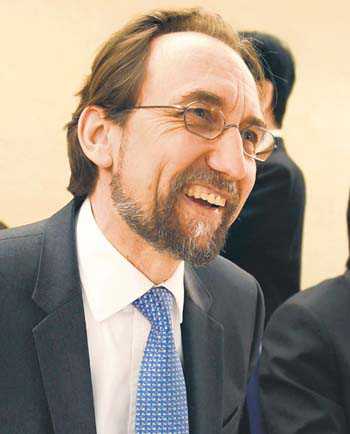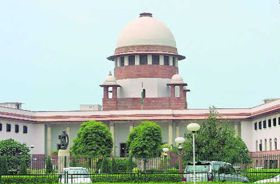
MOTIVATED? Zeid Ra''ad Al Hussein, UN High Commissioner for Human Rights. AFP
Ghulam Rasool Dehlvi
INDIAN Army Chief Bipin Rawat has broken his silence on the recent UN report cataloguing alleged human rights violations in Jammu and Kashmir. "I don't think we need to speak on the United Nations report on Kashmir," he said.
That the Army Chief has taken cognisance of the UN report on Kashmir following the vehement rejection of its veracity by the Centre is interesting to note. But merely saying it isn't worth talking about as it is "motivated" or "fallacious", "tendentious" and "overtly prejudiced" to build a "false narrative" is not sufficient. Truth has to be told with more intellectual rigour and courage with due respect to international laws.
A critical appraisal of the 49-page report prepared by the UN Office of the High Commissioner for Human Rights (OHCHR) unravels its fallibility based on 'unverified information'. Hence, every unbiased observer took it with a pinch of salt.
India was not alone in its strongly worded rebuttal to the OHCHR report. Six more nations rejected the report authored by Zeid Ra'ad Al Hussein: two from Asia (Bhutan, Afghanistan), one from Africa (Mauritius), one from Eurasia (Belarus), and two from Latin America (Cuba, Venezuela). The report was discussed and dismissed by all these countries during the 'General debate on the overall update of the High Commissioner on the situation of Human Rights worldwide and on the activities of his office' at the Human Rights Council.
Both the motif and timing of the report were questioned, and rightly so. Taking into account that this 'probe' into alleged human rights violations in Kashmir was headed by the Jordanian diplomat and OHCHR chief Zeid Ra'ad al-Hussein, it is not difficult to find fallibility in it.
The UN High Commissioner's mandate clearly states that he should conduct his work respecting "sovereignty, territorial integrity and domestic jurisdiction of member states." But to the utter surprise of the close observers of the Indo-Pak conflict, Zeid was recently seen in pictures with Pakistani Hurriyat faction leader Syed Faiz and other leaders from Pakistan. This has led to the crucial question: where were his facts coming from?
Zeid proclaims that his findings are based on documentary evidence in the public domain, including from governmental sources in Kashmir, India and Pakistan. But there is little to support his credentials in the compilation of this report.
The Jordanian diplomat-Prince Zeid became the High Commissioner for Human Rights in June, 2014 with the approval of the 193 member-states of the United Nations General Assembly. Several diplomats from western democracies stressed Zeid's Muslim and Arab background combined with his progressive credentials as crucial for bridging the gap between the UN's western states and Islamic countries. But there are grounds for growing concern and legitimate worries about how dramatically Zeid is seen as an 'ally' in Islamic countries like Pakistan. He is arguably referred to as the 'most befitting friend' and an 'avid advocate' for the cause of 'Azaad Kashmir' at UN.
On March 9, 2018, Pakistani news channel Neo Tv Network published photos of Zeid R'ad al-Hussain meeting with Awais Ahmad Khan Leghari, a Pakistani politician and Special Envoy of the PM on Kashmir, in his bid to highlight the Pakistan narrative of the Kashmir issue. Tellingly, High Commissioner Zeid thanked the Special Envoy for 'briefing' him on the human rights situation, as widely reported. Interestingly, the Pakistani TV channel concludes that the recent report which is the first of its kind released by the UN is an indirect outcome of the meeting between Zeid and Awais. It reports: "On the occasion of Burhan Wani's killing, Awais Leghari visited Geneva to meet with Zeid al-Ra'ad in order to brief him about Burhan Wani and the Kashmir issue. Only two months after this meet, the UN has broken its 50-year-long silence on the Kashmir dispute, and the credit goes to Zeid al-Ra'ad al-Hussain." (Source: youtube).
This background of the OHRC report on Kashmir raises a pertinent question: Did Zeid look at Kashmir with the same prism as the OIC (Organisation for Islamic Cooperation) where Pakistan flogs its story every year?
More particular questions had to be asked in this regard, such as: why did the UN High Commissioner for HR make it a 'special report' so selectively, while it does not cite any resolution of the General Assembly, the Human Rights Council or the Security Council as the mandate for it? Worse, Zeid's report refers to LeT, JeM and Harkat-ul-Mujahideen as "armed groups" while they are all listed as terrorist organisations by the Security Council.
The UN High Commissioner for Human Rights has egregiously violated his mandate by wholly ignoring the scale of violence being peddled by extremist outfits.
One of the major reasons why human rights in Kashmir are in doldrums is religious militancy. Faith-based insurgents have perpetrated grave human rights violations in a large section of the clergy-controlled Kashmiri populace, where secular educational institutions are not welcome.
Ansar Ghazwatul Hindi, an avatar of the Al-Qaeda ideology in the valley, promotes medieval concepts and exclusivist online narratives to radicalise the Kashmiri youths. Dukhtaran-e-Millat, an all-woman group, advocates 'full-veiled jihad' to establish 'Islamic' rule in Kashmir and has supported Kashmir's two-decade long insurgency, declared secular education akin to haram (forbidden) much like the Boko Haram which translates into 'western education is haram'.
Recently, a school bus carrying children was attacked in the militant-infested Shopian district of South Kashmir. the Parents see an increased risk, when schools in the state have been attacked. Shujaat Bukhari, journalist, fell victim of such dastardly designs for speaking of peace and reconciliation in Kashmir on international forums, just as many other intellectuals have met the same end.
At this critical juncture, it is distressing to see human rights bodies undermine their own credibility and ignore the violence of militants.



























